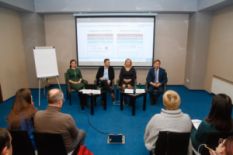Vsevolod Kozhemyako
Chief Executive Officer of Agrotrade Group
 In fact, large Ukrainian agricultural companies have long been using advanced technologies. We are also constantly learning and improving, and we understand high-tech as not only agricultural production organized in accordance with the latest achievements of agrarian science and technology, but also the use of information technologies and improvement of business processes.
In fact, large Ukrainian agricultural companies have long been using advanced technologies. We are also constantly learning and improving, and we understand high-tech as not only agricultural production organized in accordance with the latest achievements of agrarian science and technology, but also the use of information technologies and improvement of business processes.
It does not matter what kind of business it is: agrarian, construction, pharm. So, one of our latest IT innovations is the introduction of a system for the remote monitoring and control of field work and the condition of crops using a special mobile application. Now we can work remotely, with the managing company assigning tasks to production specialists, quickly monitoring their implementation and keeping records of the materials used. Naturally, to ensure that this system is used effectively, we needed to teach both economists and accountants, as well as specialists working in the field and preparing reports, how to use it. And staff training is another component of high-tech operation.
To sum it up, I would like to repeat: we consider the technological effectiveness of agribusiness as a set of measures which includes the introduction of advanced technologies in the organization of production, effective organization of business processes, including monitoring, accounting and control, and continuous improvement of staff skills. Leading Ukrainian companies are quite competitive in this sense.
Yuliya Poroshenko
The founder of the Agrohub innovation platform, co-founder of Radar Tech
_opt.jpeg) The Agrohub innovation platform was born out of awareness of opportunities that are opening up for Ukrainian agribusiness when introducing innovations. Agrohub's task is to fast-track national producers on the path from an agrarian to AgroTech country.
The Agrohub innovation platform was born out of awareness of opportunities that are opening up for Ukrainian agribusiness when introducing innovations. Agrohub's task is to fast-track national producers on the path from an agrarian to AgroTech country.
Now that we have been doing this for a year, I can name three main obstacles we have met along the way:
- Statistics tell us that 70% of transformation programs fail, above all, due to staff resistance. Innovation success requires working with people at all levels and creating an ownership culture, in which everyone is interested in the company's efficiency.
- Agricultural companies do not know what technologies are already on the market. Therefore, we began to compile a database of practically tested innovative solutions for the agricultural sector.
- The general culture of innovations is not developed. Ukrainians are traditionalists, there are historical reasons for this, and few parents want a start-up career for their children. So, there are few innovators in the country, and even fewer in agriculture. To promote innovation, to teach talents, to create development programs is a separate field of work for Agrohub.
And on the contrary, the human factor, which is a problem for many companies, in my opinion, contributes to the transition to AgroTech. Management sees that by using technology, human work can be automated. We are talking about hard routine work in the field, about accounting, collection of data about the field, and about sales. It gives quick returns to the business.
Large agricultural holdings play the role of "icebreakers" here, and rightly so: they have the resources to try new things, allocate part of the field to pilot projects, and assign employees to work with innovations.
Bogdan Danylyshyn
Member of the National Academy of Sciences
 The only defining factors for the development of people and their capacities should be their talent and potential. If we ensure conditions that will allow budding Ostrogradskyy, Gamov, Korolev and Glushkov of our days to unlock their research, technical and creative potential; if we create opportunities for promising Ukrainian scientists domestically, our country will start moving up the ratings of the world's innovative economies.
The only defining factors for the development of people and their capacities should be their talent and potential. If we ensure conditions that will allow budding Ostrogradskyy, Gamov, Korolev and Glushkov of our days to unlock their research, technical and creative potential; if we create opportunities for promising Ukrainian scientists domestically, our country will start moving up the ratings of the world's innovative economies.
Photos provided by Vsevolod Kozhemyako, Yuliya Poroshenko, Bogdan Danylyshyn, shutterstock.com.









